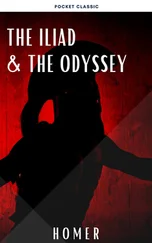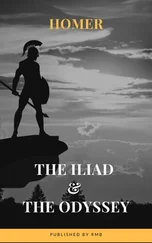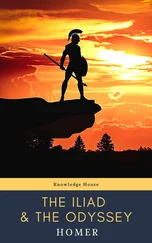John Milton - The Epic Poems Anthology - The Iliad, The Odyssey, The Aeneid, The Divine Comedy...
Здесь есть возможность читать онлайн «John Milton - The Epic Poems Anthology - The Iliad, The Odyssey, The Aeneid, The Divine Comedy...» — ознакомительный отрывок электронной книги совершенно бесплатно, а после прочтения отрывка купить полную версию. В некоторых случаях можно слушать аудио, скачать через торрент в формате fb2 и присутствует краткое содержание. Жанр: unrecognised, на английском языке. Описание произведения, (предисловие) а так же отзывы посетителей доступны на портале библиотеки ЛибКат.
- Название:The Epic Poems Anthology : The Iliad, The Odyssey, The Aeneid, The Divine Comedy...
- Автор:
- Жанр:
- Год:неизвестен
- ISBN:нет данных
- Рейтинг книги:4 / 5. Голосов: 1
-
Избранное:Добавить в избранное
- Отзывы:
-
Ваша оценка:
- 80
- 1
- 2
- 3
- 4
- 5
The Epic Poems Anthology : The Iliad, The Odyssey, The Aeneid, The Divine Comedy...: краткое содержание, описание и аннотация
Предлагаем к чтению аннотацию, описание, краткое содержание или предисловие (зависит от того, что написал сам автор книги «The Epic Poems Anthology : The Iliad, The Odyssey, The Aeneid, The Divine Comedy...»). Если вы не нашли необходимую информацию о книге — напишите в комментариях, мы постараемся отыскать её.
This collection includes:
–The Iliad and The Odyssey by Homer
–The Aeneid, by Virgil
–The Divine Comedy, by Dante Alighieri
–Venus and Adonis, by William Shakespeare
–Paradise Lost and Paradise Regained, by John Milton
The Epic Poems Anthology : The Iliad, The Odyssey, The Aeneid, The Divine Comedy... — читать онлайн ознакомительный отрывок
Ниже представлен текст книги, разбитый по страницам. Система сохранения места последней прочитанной страницы, позволяет с удобством читать онлайн бесплатно книгу «The Epic Poems Anthology : The Iliad, The Odyssey, The Aeneid, The Divine Comedy...», без необходимости каждый раз заново искать на чём Вы остановились. Поставьте закладку, и сможете в любой момент перейти на страницу, на которой закончили чтение.
Интервал:
Закладка:
“Listen,” she cried, “sisters, daughters of Nereus, that you may hear the burden of my sorrows. Alas, woe is me, woe in that I have borne the most glorious of offspring. I bore him fair and strong, hero among heroes, and he shot up as a sapling; I tended him as a plant in a goodly garden, and sent him with his ships to Ilius to fight the Trojans, but never shall I welcome him back to the house of Peleus. So long as he lives to look upon the light of the sun he is in heaviness, and though I go to him I cannot help him. Nevertheless I will go, that I may see my dear son and learn what sorrow has befallen him though he is still holding aloof from battle.”
She left the cave as she spoke, while the others followed weeping after, and the waves opened a path before them. When they reached the rich plain of Troy, they came up out of the sea in a long line on to the sands, at the place where the ships of the Myrmidons were drawn up in close order round the tents of Achilles. His mother went up to him as he lay groaning; she laid her hand upon his head and spoke piteously, saying, “My son, why are you thus weeping? What sorrow has now befallen you? Tell me; hide it not from me. Surely Jove has granted you the prayer you made him, when you lifted up your hands and besought him that the Achaeans might all of them be pent up at their ships, and rue it bitterly in that you were no longer with them.”
Achilles groaned and answered, “Mother, Olympian Jove has indeed vouchsafed me the fulfilment of my prayer, but what boots it to me, seeing that my dear comrade Patroclus has fallen—he whom I valued more than all others, and loved as dearly as my own life? I have lost him; aye, and Hector when he had killed him stripped the wondrous armour, so glorious to behold, which the gods gave to Peleus when they laid you in the couch of a mortal man. Would that you were still dwelling among the immortal sea-nymphs, and that Peleus had taken to himself some mortal bride. For now you shall have grief infinite by reason of the death of that son whom you can never welcome home—nay, I will not live nor go about among mankind unless Hector fall by my spear, and thus pay me for having slain Patroclus son of Menoetius.”
Thetis wept and answered, “Then, my son, is your end near at hand—for your own death awaits you full soon after that of Hector.”
Then said Achilles in his great grief, “I would die here and now, in that I could not save my comrade. He has fallen far from home, and in his hour of need my hand was not there to help him. What is there for me? Return to my own land I shall not, and I have brought no saving neither to Patroclus nor to my other comrades of whom so many have been slain by mighty Hector; I stay here by my ships a bootless burden upon the earth, I, who in fight have no peer among the Achaeans, though in council there are better than I. Therefore, perish strife both from among gods and men, and anger, wherein even a righteous man will harden his heart—which rises up in the soul of a man like smoke, and the taste thereof is sweeter than drops of honey. Even so has Agamemnon angered me. And yet—so be it, for it is over; I will force my soul into subjection as I needs must; I will go; I will pursue Hector who has slain him whom I loved so dearly, and will then abide my doom when it may please Jove and the other gods to send it. Even Hercules, the best beloved of Jove—even he could not escape the hand of death, but fate and Juno’s fierce anger laid him low, as I too shall lie when I am dead if a like doom awaits me. Till then I will win fame, and will bid Trojan and Dardanian women wring tears from their tender cheeks with both their hands in the grievousness of their great sorrow; thus shall they know that he who has held aloof so long will hold aloof no longer. Hold me not back, therefore, in the love you bear me, for you shall not move me.”
Then silver-footed Thetis answered, “My son, what you have said is true. It is well to save your comrades from destruction, but your armour is in the hands of the Trojans; Hector bears it in triumph upon his own shoulders. Full well I know that his vaunt shall not be lasting, for his end is close at hand; go not, however, into the press of battle till you see me return hither; to-morrow at break of day I shall be here, and will bring you goodly armour from King Vulcan.”
On this she left her brave son, and as she turned away she said to the sea-nymphs her sisters, “Dive into the bosom of the sea and go to the house of the old sea-god my father. Tell him everything; as for me, I will go to the cunning workman Vulcan on high Olympus, and ask him to provide my son with a suit of splendid armour.”
When she had so said, they dived forthwith beneath the waves, while silver-footed Thetis went her way that she might bring the armour for her son.
Thus, then, did her feet bear the goddess to Olympus, and meanwhile the Achaeans were flying with loud cries before murderous Hector till they reached the ships and the Hellespont, and they could not draw the body of Mars’s servant Patroclus out of reach of the weapons that were showered upon him, for Hector son of Priam with his host and horsemen had again caught up to him like the flame of a fiery furnace; thrice did brave Hector seize him by the feet, striving with might and main to draw him away and calling loudly on the Trojans, and thrice did the two Ajaxes, clothed in valour as with a garment, beat him from off the body; but all undaunted he would now charge into the thick of the fight, and now again he would stand still and cry aloud, but he would give no ground. As upland shepherds that cannot chase some famished lion from a carcase, even so could not the two Ajaxes scare Hector son of Priam from the body of Patroclus.
And now he would even have dragged it off and have won imperishable glory, had not Iris fleet as the wind, winged her way as messenger from Olympus to the son of Peleus and bidden him arm. She came secretly without the knowledge of Jove and of the other gods, for Juno sent her, and when she had got close to him she said, “Up, son of Peleus, mightiest of all mankind; rescue Patroclus about whom this fearful fight is now raging by the ships. Men are killing one another, the Danaans in defence of the dead body, while the Trojans are trying to hale it away, and take it to wind Ilius: Hector is the most furious of them all; he is for cutting the head from the body and fixing it on the stakes of the wall. Up, then, and bide here no longer; shrink from the thought that Patroclus may become meat for the dogs of Troy. Shame on you, should his body suffer any kind of outrage.”
And Achilles said, “Iris, which of the gods was it that sent you to me?”
Iris answered, “It was Juno the royal spouse of Jove, but the son of Saturn does not know of my coming, nor yet does any other of the immortals who dwell on the snowy summits of Olympus.”
Then fleet Achilles answered her saying, “How can I go up into the battle? They have my armour. My mother forbade me to arm till I should see her come, for she promised to bring me goodly armour from Vulcan; I know no man whose arms I can put on, save only the shield of Ajax son of Telamon, and he surely must be fighting in the front rank and wielding his spear about the body of dead Patroclus.”
Iris said, ‘We know that your armour has been taken, but go as you are; go to the deep trench and show yourelf before the Trojans, that they may fear you and cease fighting. Thus will the fainting sons of the Achaeans gain some brief breathing-time, which in battle may hardly be.”
Iris left him when she had so spoken. But Achilles dear to Jove arose, and Minerva flung her tasselled aegis round his strong shoulders; she crowned his head with a halo of golden cloud from which she kindled a glow of gleaming fire. As the smoke that goes up into heaven from some city that is being beleaguered on an island far out at sea—all day long do men sally from the city and fight their hardest, and at the going down of the sun the line of beacon-fires blazes forth, flaring high for those that dwell near them to behold, if so be that they may come with their ships and succour them—even so did the light flare from the head of Achilles, as he stood by the trench, going beyond the wall—but he aid not join the Achaeans for he heeded the charge which his mother laid upon him.
Читать дальшеИнтервал:
Закладка:
Похожие книги на «The Epic Poems Anthology : The Iliad, The Odyssey, The Aeneid, The Divine Comedy...»
Представляем Вашему вниманию похожие книги на «The Epic Poems Anthology : The Iliad, The Odyssey, The Aeneid, The Divine Comedy...» списком для выбора. Мы отобрали схожую по названию и смыслу литературу в надежде предоставить читателям больше вариантов отыскать новые, интересные, ещё непрочитанные произведения.
Обсуждение, отзывы о книге «The Epic Poems Anthology : The Iliad, The Odyssey, The Aeneid, The Divine Comedy...» и просто собственные мнения читателей. Оставьте ваши комментарии, напишите, что Вы думаете о произведении, его смысле или главных героях. Укажите что конкретно понравилось, а что нет, и почему Вы так считаете.












